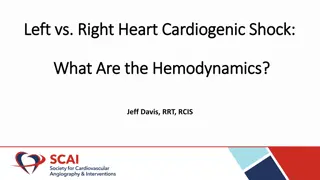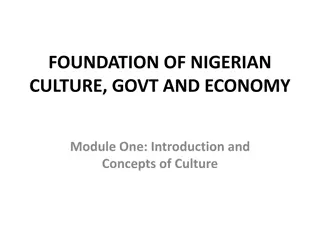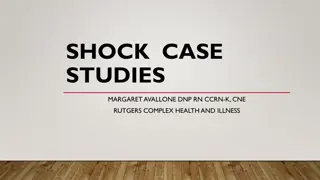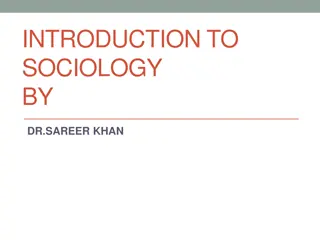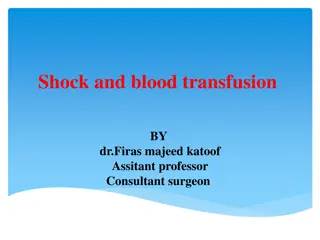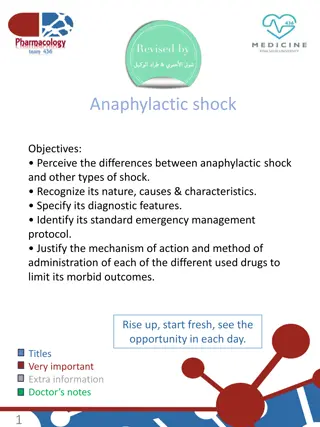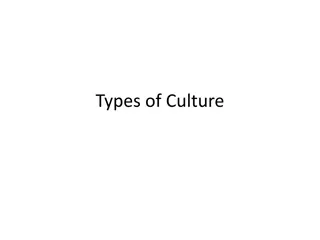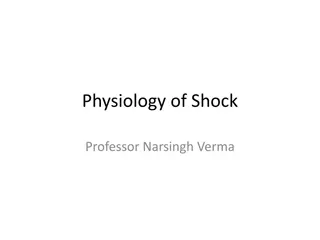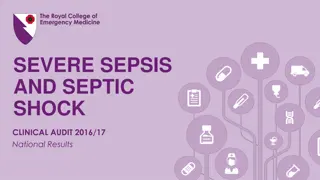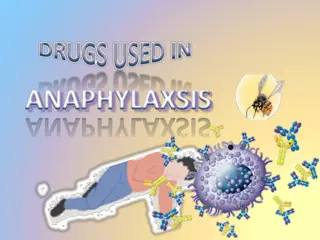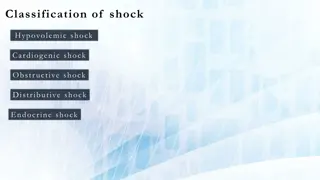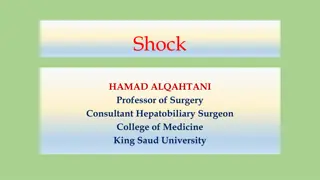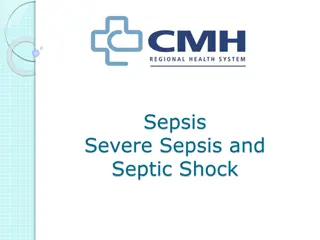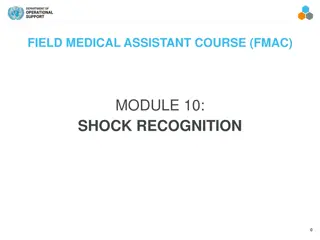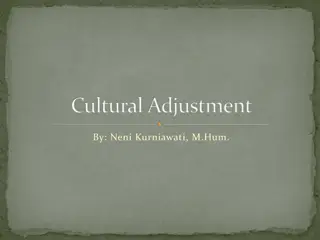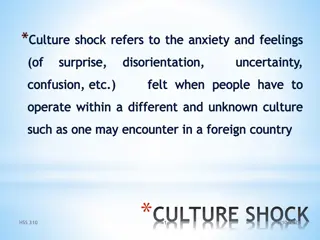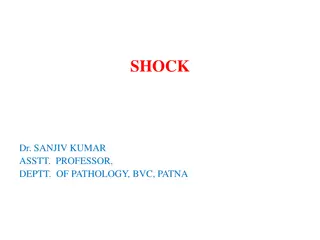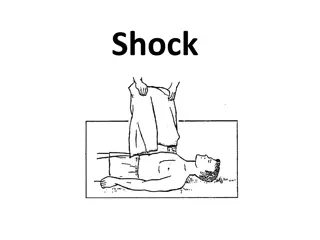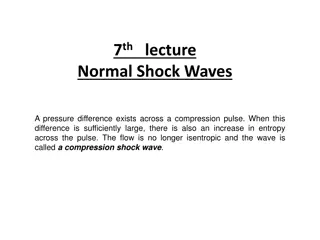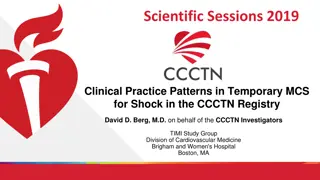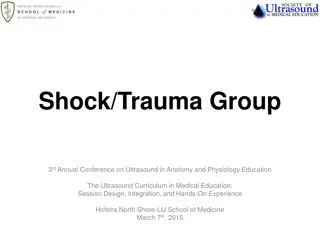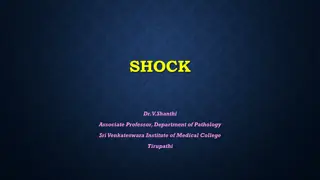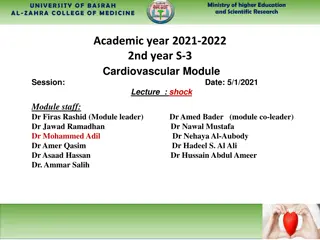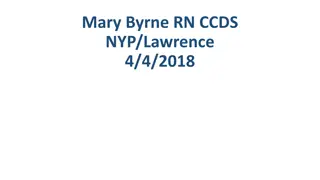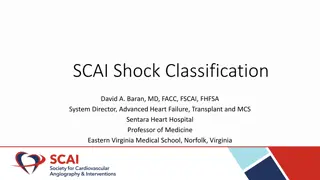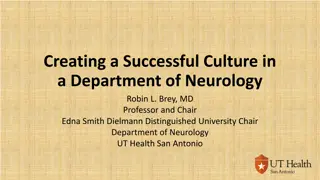Understanding Shock: Causes, Symptoms, and Stages
Shock is a critical condition caused by an imbalance between cellular oxygen supply and demand, leading to organ dysfunction. Compensatory responses include increased heart rate, vasoconstriction, and hormonal adjustments. Recognizable features of shock include tachycardia, hypotension, cool clammy
3 views • 27 slides
Understanding Hemodynamics in Left vs. Right Heart and Cardiogenic Shock
Explore the hemodynamic differences between the left and right heart, the etiologies of cardiogenic shock, and the importance of right heart catheterization in managing this critical condition. Learn about key parameters such as PCWP, RAP, CO, and more that play a crucial role in assessing cardiac f
1 views • 14 slides
Understanding Nigerian Culture, Government, and Economy: Module One
Delve into Module One of the course on Nigerian culture, government, and economy with a focus on the Introduction and Concepts of Culture. Explore definitions of culture, various types of culture, characteristics, importance, related concepts, levels, and differences between culture and ethnic group
1 views • 31 slides
Shock Case Studies: Patient Management Scenarios and Interventions
Explore patient scenarios of hypovolemic shock post-surgery, learn key assessments, prioritize actions, recognize shock manifestations, and apply interventions. Dive into the complexities of patient care in critical situations.
0 views • 60 slides
Understanding Plant Tissue Culture: Methods and Requirements
Plant tissue culture involves the in-vitro culture of plant explants under aseptic conditions, covering cell, organ, and suspension cultures. This process, pioneered by German botanist Gottlieb Haberlandt, relies on the totipotency of plant cells. Key requirements include laboratory organization, su
0 views • 18 slides
Understanding Culture in Sociology: Key Concepts and Definitions
Culture is the cornerstone of society, distinguishing humans from animals and shaping our social lives. Sociologists define culture as the shared values, practices, norms, and beliefs that govern our interactions and behaviors. This comprehensive guide explores the non-material aspects of culture, i
1 views • 30 slides
Overview of Cell Culture Methods and Importance in Research
Introduction to the principles of cell culture, including tissue culture, organ culture, and cell culture methods. Discusses the advantages and disadvantages of each technique and highlights the need for cell culture in research for studying cellular behavior and large-scale production of cell mater
3 views • 45 slides
Understanding Shock and Blood Transfusion in Surgery
Shock is a state of low tissue perfusion leading to metabolic changes like anaerobic metabolism and acidosis. As cellular hypoxia progresses, immune and coagulation responses are activated, impacting cardiovascular, respiratory, renal, and endocrine systems. Shock can be classified into hypovolaemic
0 views • 38 slides
Understanding Anaphylactic Shock: Diagnosis, Management, and Drug Therapy
Anaphylactic shock is a life-threatening allergic reaction that can lead to shock and airway swelling. Learn about the differences from other types of shock, diagnostic features, emergency management protocol, and drug therapy to limit morbid outcomes. Discover the nature, causes, and characteristic
1 views • 12 slides
Understanding the Biochemistry of Shock
Shock is a critical condition where circulation fails to meet cells' nutritional needs, leading to a range of potentially life-threatening events. Primary and secondary types of shock are discussed, emphasizing the significant impact on oxygen supply and demand at the cellular level. The effects of
0 views • 17 slides
Understanding Popular Culture: Classification and Impact
General classification of culture includes Popular, High/Elite, Low/Subculture, Primary & Secondary, Folk, and Co-Culture. Popular culture, shaped by mass media, encompasses ideas, attitudes, and phenomena favored by society. It influences daily life, with examples like styles of dress, slang, and s
0 views • 16 slides
Understanding the Physiology of Shock by Professor Narsingh Verma
Shock is a critical condition resulting from poor tissue perfusion and impaired cellular metabolism. Various definitions describe it as inadequate delivery of oxygen and nutrients, leading to reversible or irreversible cellular injury. Different types of shock, such as hypovolemic shock, have common
0 views • 24 slides
National Audit Results for Severe Sepsis and Septic Shock 2016/17
This presentation outlines the national results of a clinical audit conducted in 2016/17 regarding the management of severe sepsis and septic shock in Emergency Departments (EDs). The audit objectives include benchmarking current performance, facilitating national and peer comparisons, identifying a
0 views • 25 slides
Understanding Anaphylaxis and Anaphylactic Shock
Anaphylaxis is a severe allergic reaction affecting the entire body, while anaphylactic shock is a life-threatening manifestation of this reaction involving shock and airway swelling. This comprehensive material delves into the nature, causes, symptoms, diagnostic features, emergency management prot
0 views • 18 slides
Overview of Shock Classifications and Causes
Shock is classified into different types such as Hypovolemic, Cardiogenic, Obstructive, Distributive, and Endocrine shock. Hypovolemic shock results from fluid loss, while Cardiogenic shock is due to heart failure. Obstructive shock occurs from mechanical obstructions, whereas Distributive shock is
1 views • 11 slides
Understanding Shock: Etiology, Pathophysiology, Diagnosis, and Management Priorities
Shock, a condition where blood circulation fails to deliver sufficient oxygen, is a common cause of death in surgical patients. Recognizing shock early is crucial to prevent irreversible tissue damage and organ failure. It is vital to understand the various aspects such as etiology, pathophysiology,
2 views • 55 slides
Understanding Sepsis and Its Impact on Patient Care
Sepsis is a life-threatening condition resulting from the body's response to an infection, leading to shock, multiple organ failure, and potentially death if left untreated. Recognizing and treating sepsis promptly is crucial, as it has a high mortality rate and can have a significant impact on pati
1 views • 21 slides
Tactical Field Care - Shock Recognition and Management
Tactical Field Care emphasizes the importance of shock recognition and prompt intervention to prevent casualties on the battlefield. Understanding the signs, symptoms, and management steps of shock, particularly in trauma cases with life-threatening bleeding, is crucial for medical personnel. This m
0 views • 18 slides
Understanding Cultural Adjustment: Navigating Different Ways of Life
Cultural adjustment involves experiencing culture shock when encountering a new way of life due to immigration, travel, or a shift in social environments. This process includes symptoms like excessive concern, fear of physical contact, and refusal to learn the host country's language. Overcoming cul
0 views • 12 slides
Cultural Adaptation: Understanding Culture Shock and the Adaptation Process
Cultural adaptation involves facing culture shock when living abroad, experiencing various symptoms like homesickness and conflict, understanding cultural variations in body language and perceptions, and going through stages of adaptation from fun and excitement to biculturalism. Tips and insights a
0 views • 17 slides
Understanding Culture Shock: Phases, Symptoms, and Coping Strategies
Culture shock is the anxiety and disorientation experienced when adapting to a new and unfamiliar culture. This phenomenon involves various stages, from the honeymoon phase to readjustment and reverse culture shock. Symptoms of culture shock can be physiologically, psychologically, and socially base
1 views • 11 slides
Proposed NRC Safety Culture Policy Statement Overview
This document provides an overview of the proposed Nuclear Regulatory Commission (NRC) Safety Culture Policy Statement presented by Eric Fries, the Safety Culture Program Manager. It covers topics such as NRC's mission, responsibility, safety culture background, draft policy statement, current statu
0 views • 24 slides
Essential Tips for Academic Communication and Conduct
Understand the consequences of cheating and plagiarism in academic settings, follow proper email etiquette, respect office protocols, dress appropriately, and be aware of the stages and symptoms of culture shock when studying abroad. Maintain good academic practices to avoid penalties, respond to em
0 views • 16 slides
Plant Tissue Culture Methods for Growth and Reproduction Study
Plant tissue culture methods such as root tip culture, shoot-tip culture, leaf culture, flower culture, and anther and pollen culture allow for the study of growth, reproduction, and genetic variations in plants. These techniques involve culturing various plant parts under sterile conditions to inve
1 views • 20 slides
Analyzing Shock and G-Force with dImpack Android App
Explore the dImpack app utilizing Android phone sensors to measure shock levels during activities like walking or running. Learn about G-force calculations, statistics, and software implementation. Understand how acceleration impacts the body and the importance of monitoring shock levels for health.
0 views • 18 slides
Understanding Shock: Types, Mechanisms, and Causes by Dr. Sanjiv Kumar
Shock, a critical medical emergency, results from the failure of the circulatory system to adequately perfuse vital organs. This comprehensive overview delves into the different types of shock such as cardiogenic, hypovolemic, septic/endotoxic, neurogenic, and anaphylactic shock. Each type is explor
0 views • 12 slides
Understanding Shock: Types, Classification, and Clinical Course
Shock is a critical state where the circulatory system fails to adequately perfuse cells, leading to oxygen and nutrient delivery reduction. It can be classified into hypovolemic, cardiogenic, and distributive types, with septic shock caused by microbial infections. Shock progresses through stages f
0 views • 8 slides
Understanding Shock: Definitions, Types, and Management Principles
Shock is a condition characterized by inadequate tissue perfusion, leading to a range of systemic effects. This article outlines the definitions, signs and symptoms, general principles of management, and specific types of shock, including hypovolemic, cardiogenic, neurogenic, anaphylactic, and septi
0 views • 20 slides
Understanding Normal Shock Waves in Gas Dynamics
In gas dynamics, normal shock waves occur when there is a significant pressure difference across a compression pulse, leading to increased entropy. This results in non-isentropic flow known as compression shock waves. The formation of compression and expansion waves can be likened to piston movement
0 views • 16 slides
Clinical Practice Patterns in Temporary MCS for Shock
Investigating clinical practice patterns of temporary MCS use in contemporary CICUs, the CCCTN Registry gathered data on temporary MCS devices like IABP, Impella, TandemHeart, and VA-ECMO between Sept 2017 - Sept 2018. The study provided insights into indications for temporary MCS, variations in dev
0 views • 13 slides
Ultrasound Curriculum in Medical Education: Shock/Trauma Group Conference 2015
Development of a longitudinal ultrasound module focusing on the pathophysiology of shock for educational purposes, aiming to enhance knowledge and skills in the evaluation and management of shock patients. The curriculum includes learning objectives covering shock classifications, differential diagn
0 views • 10 slides
Dynamic Calibration of Pressure Transducers in a Shock Tube
This study focuses on the dynamic calibration of pressure transducers in a shock tube to understand boundary layer stability and transition. By creating a shock to impact a Kulite pressure transducer mounted at the end of the tube, researchers aim to determine key parameters such as resonance, dampi
0 views • 11 slides
Understanding Shock: Types, Mechanisms, and Pathophysiology
Shock, a state of systemic hypotension resulting in impaired tissue perfusion and cellular hypoxia, has various types such as cardiogenic, hypovolemic, septic, neurogenic, and anaphylactic shock. Each type has different mechanisms and causes, leading to decreased cardiac output and multiorgan failur
0 views • 45 slides
Understanding Shock in Medical Science: Definitions, Classification, and Management
Shock is a critical condition caused by poor tissue perfusion leading to impaired cellular metabolism. This article discusses the definition of shock, its classification including septic, anaphylactic, cardiogenic, hypovolemic, and neurogenic shock, along with the clinical manifestations and hemodyn
0 views • 19 slides
Understanding Postoperative Shock and Respiratory Failure
Postoperative shock refers to different types of shock that may occur after surgery, such as hypovolemic, cardiogenic, or septic shock. It is crucial to recognize the signs and symptoms of shock early to prevent irreversible consequences. On the other hand, respiratory failure can be acute or chroni
0 views • 8 slides
Understanding the SCAI Shock Classification System
The SCAI Shock Classification, led by Dr. David A. Baran, introduces a new definition for cardiogenic shock, emphasizing simplicity, adaptability, and improved communication among healthcare providers. It aims to enhance patient assessment, reclassification, and research outcomes, emphasizing a mult
0 views • 27 slides
Understanding Shock: Causes, Phases, and Pathophysiology
This comprehensive guide delves into the various aspects of shock, including hypovolemia, pulmonary embolism, and acute myocardial infarction. It covers the general concept of shock, circulatory failure, phases of shock, pathophysiology, manifestations, diagnostic approaches, and complications such
0 views • 52 slides
Treatment Options for Cardiogenic Shock: Pharmaceutical and Mechanical Support
This article discusses pharmaceutical treatment options for cardiogenic shock, including milrinone, dobutamine, and dopamine. It also explores criteria for escalating treatment to mechanical support in cases of severe shock. The comparison between milrinone and dobutamine in supporting patients awai
0 views • 19 slides
Cultivating a Successful Culture in Neurology Department
Importance of culture in a neurology department highlighted by Dr. Robin L. Brey. Emphasis on how culture trumps strategy and the role of leaders in maintaining a positive culture. Examples and insights on how culture influences decision-making and behavior. Attributes of a successful culture and ho
0 views • 21 slides
Understanding Traffic Flow Theory and Shock Waves in Transportation Engineering
Explore fundamental principles of traffic flow, applications of traffic flow theory, shock waves in traffic streams, and types of shock waves in transportation engineering. Learn about determining lane lengths, estimating delays, and analyzing shock wave behaviors in various traffic scenarios. Delve
0 views • 18 slides

